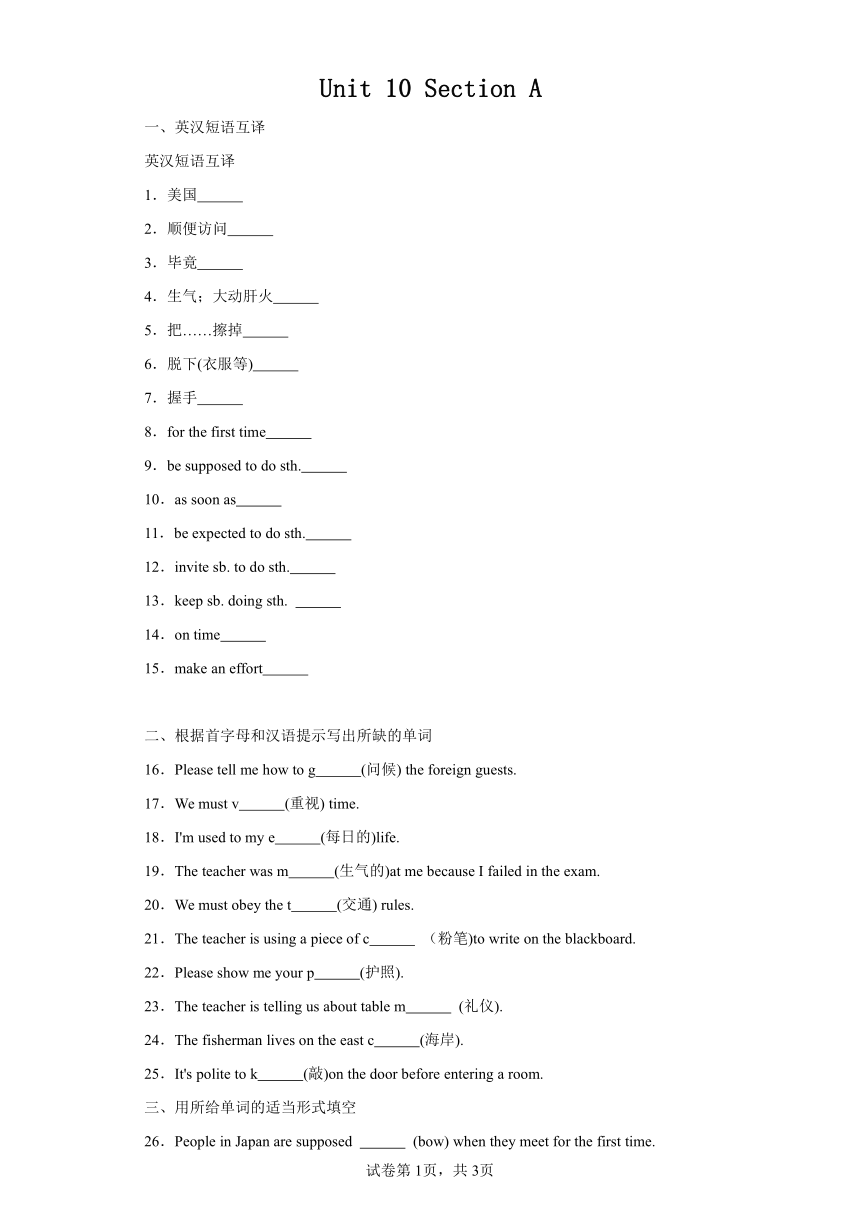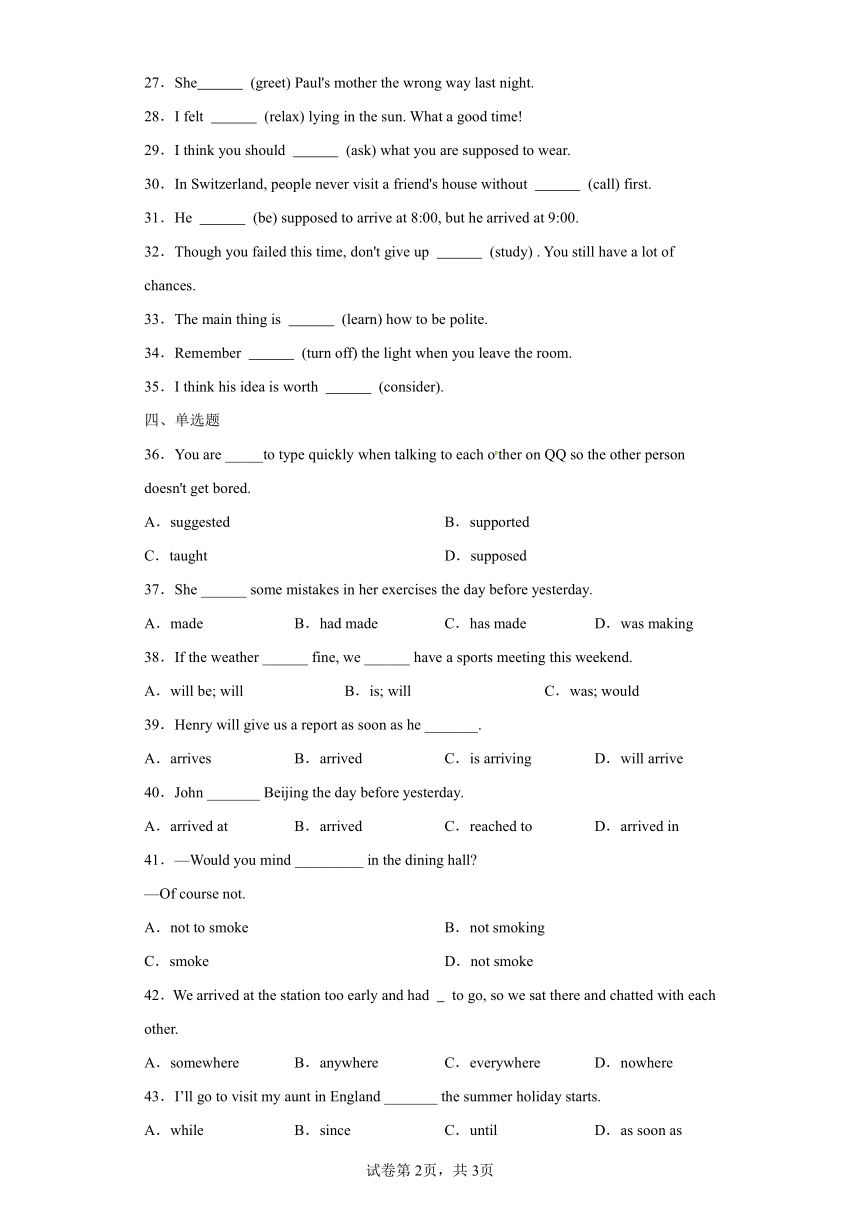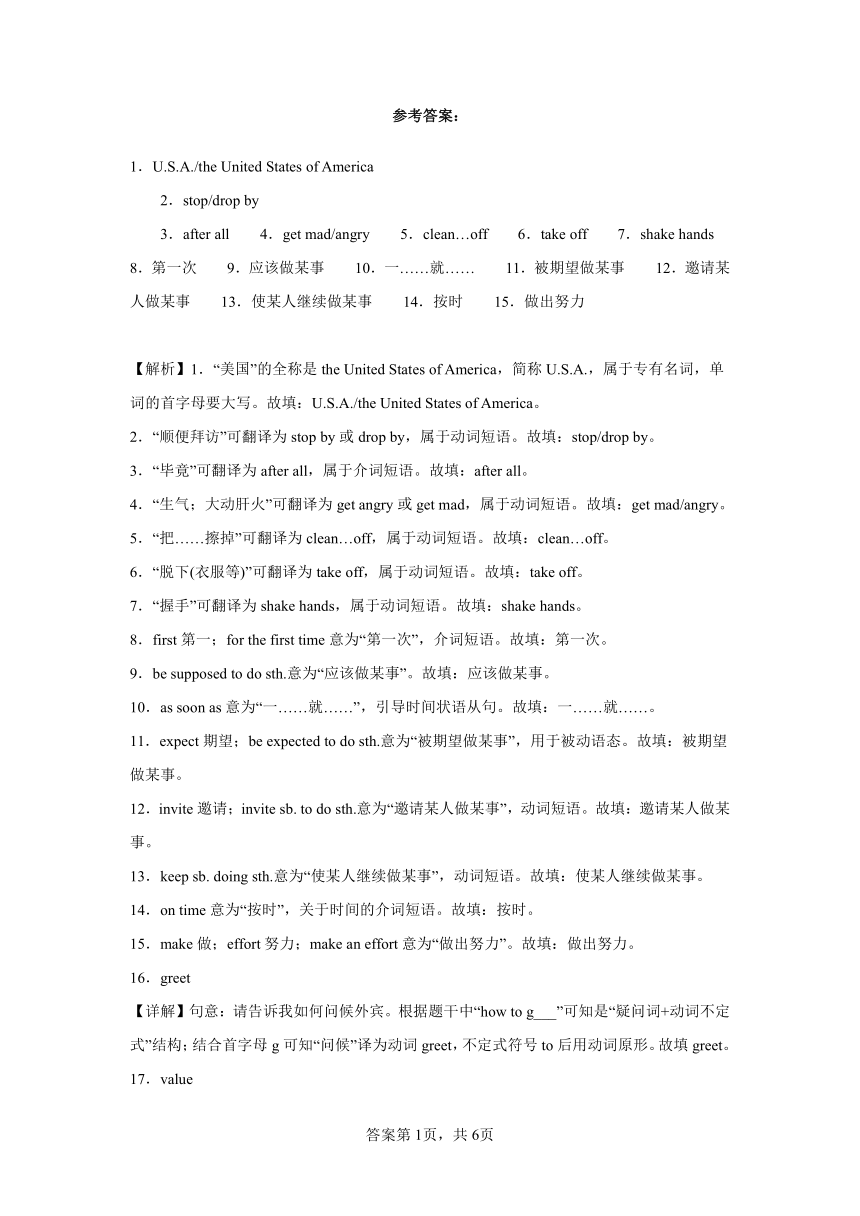Unit 10 You're supposed to shake hands.SectionA练习(含解析)
文档属性
| 名称 | Unit 10 You're supposed to shake hands.SectionA练习(含解析) |  | |
| 格式 | docx | ||
| 文件大小 | 27.0KB | ||
| 资源类型 | 教案 | ||
| 版本资源 | 人教新目标(Go for it)版 | ||
| 科目 | 英语 | ||
| 更新时间 | 2023-12-05 11:08:04 | ||
图片预览





文档简介
Unit 10 Section A
一、英汉短语互译
英汉短语互译
1.美国
2.顺便访问
3.毕竟
4.生气;大动肝火
5.把……擦掉
6.脱下(衣服等)
7.握手
8.for the first time
9.be supposed to do sth.
10.as soon as
11.be expected to do sth.
12.invite sb. to do sth.
13.keep sb. doing sth.
14.on time
15.make an effort
二、根据首字母和汉语提示写出所缺的单词
16.Please tell me how to g (问候) the foreign guests.
17.We must v (重视) time.
18.I'm used to my e (每日的)life.
19.The teacher was m (生气的)at me because I failed in the exam.
20.We must obey the t (交通) rules.
21.The teacher is using a piece of c (粉笔)to write on the blackboard.
22.Please show me your p (护照).
23.The teacher is telling us about table m (礼仪).
24.The fisherman lives on the east c (海岸).
25.It's polite to k (敲)on the door before entering a room.
三、用所给单词的适当形式填空
26.People in Japan are supposed (bow) when they meet for the first time.
27.She (greet) Paul's mother the wrong way last night.
28.I felt (relax) lying in the sun. What a good time!
29.I think you should (ask) what you are supposed to wear.
30.In Switzerland, people never visit a friend's house without (call) first.
31.He (be) supposed to arrive at 8:00, but he arrived at 9:00.
32.Though you failed this time, don't give up (study) . You still have a lot of chances.
33.The main thing is (learn) how to be polite.
34.Remember (turn off) the light when you leave the room.
35.I think his idea is worth (consider).
四、单选题
36.You are _____to type quickly when talking to each other on QQ so the other person doesn't get bored.
A.suggested B.supported
C.taught D.supposed
37.She ______ some mistakes in her exercises the day before yesterday.
A.made B.had made C.has made D.was making
38.If the weather ______ fine, we ______ have a sports meeting this weekend.
A.will be; will B.is; will C.was; would
39.Henry will give us a report as soon as he _______.
A.arrives B.arrived C.is arriving D.will arrive
40.John _______ Beijing the day before yesterday.
A.arrived at B.arrived C.reached to D.arrived in
41.—Would you mind _________ in the dining hall
—Of course not.
A.not to smoke B.not smoking
C.smoke D.not smoke
42.We arrived at the station too early and had to go, so we sat there and chatted with each other.
A.somewhere B.anywhere C.everywhere D.nowhere
43.I’ll go to visit my aunt in England _______ the summer holiday starts.
A.while B.since C.until D.as soon as
五、完形填空
Different people have different ideas about time. People in the USA think that it is 44 to know the time. In cities in America, there are 45 in stations, factories and other buildings. Radio announcers (播音员) give you the correct time during the day. Most Americans also have watches with them 46 they go. They want to do certain things 47 certain time. They don't like to be late. They think everyone is supposed to do 48 on time. But time is not 49 important to everybody in the world. When you visit a country in South America, you will 50 that people there don't like to rush. If you had an appointment with somebody, he could probably be late 51 he might not want to arrive on time.
In South America, even the radio programs may not begin on time. The men on the radio may not think it is important to tell the exact 52 . People in South America think that clocks or watches are just machines. They think that you will 53 a clock or a watch control (控制) your life if you do everything on time.
44.A.quiet B.useless C.important D.easy
45.A.clocks B.cars C.books D.watches
46.A.whenever B.however C.whatever D.wherever
47.A.at B.on C.for D.in
48.A.nothing B.everything C.something else D.some things
49.A.such B.as C.so D.only
50.A.understand B.find C.forget D.remember
51.A.while B.but C.though D.because
52.A.time B.place C.weather D.news
53.A.put B.want C.let D.expect
试卷第1页,共3页
试卷第1页,共3页
参考答案:
1.U.S.A./the United States of America
2.stop/drop by
3.after all 4.get mad/angry 5.clean…off 6.take off 7.shake hands 8.第一次 9.应该做某事 10.一……就…… 11.被期望做某事 12.邀请某人做某事 13.使某人继续做某事 14.按时 15.做出努力
【解析】1.“美国”的全称是the United States of America,简称U.S.A.,属于专有名词,单词的首字母要大写。故填:U.S.A./the United States of America。
2.“顺便拜访”可翻译为stop by或drop by,属于动词短语。故填:stop/drop by。
3.“毕竟”可翻译为after all,属于介词短语。故填:after all。
4.“生气;大动肝火”可翻译为get angry或get mad,属于动词短语。故填:get mad/angry。
5.“把……擦掉”可翻译为clean…off,属于动词短语。故填:clean…off。
6.“脱下(衣服等)”可翻译为take off,属于动词短语。故填:take off。
7.“握手”可翻译为shake hands,属于动词短语。故填:shake hands。
8.first第一;for the first time意为“第一次”,介词短语。故填:第一次。
9.be supposed to do sth.意为“应该做某事”。故填:应该做某事。
10.as soon as意为“一……就……”,引导时间状语从句。故填:一……就……。
11.expect期望;be expected to do sth.意为“被期望做某事”,用于被动语态。故填:被期望做某事。
12.invite邀请;invite sb. to do sth.意为“邀请某人做某事”,动词短语。故填:邀请某人做某事。
13.keep sb. doing sth.意为“使某人继续做某事”,动词短语。故填:使某人继续做某事。
14.on time意为“按时”,关于时间的介词短语。故填:按时。
15.make做;effort努力;make an effort意为“做出努力”。故填:做出努力。
16.greet
【详解】句意:请告诉我如何问候外宾。根据题干中“how to g___”可知是“疑问词+动词不定式”结构;结合首字母g可知“问候”译为动词greet,不定式符号to后用动词原形。故填greet。
17.value
【详解】句意:我们必须重视时间。情态动词must后面接动词原形,表示“重视”用动词value。故填value。
18.everyday
【详解】句意:我习惯了我的每日生活。根据单词的汉语意思和句子结构可知,该空修饰后面的名词life,应用形容词。everyday是形容词,符合语境。故答案为everyday。
19.mad
【详解】句意:老师因为我考试不及格而生我的气。生气的mad,在句中作表语;be mad at sb.生某人的气,固定短语;故填mad。
20.traffic
【详解】句意:我们必须遵守交通规则。根据所给汉语意思可知,应该填的是交通,traffic意为“交通”,故填traffic。
21.chalk
【详解】句意:老师正用一支粉笔在黑板上写字。根据单词的汉语意思可知,这里考查chalk,是不可数名词,空前有“a piece of…”修饰。故答案为chalk。
22.passport
【详解】句意:请给我展示一下你的护照。“show me”后面缺宾语,表示“护照”用单数名词passport。故填passport。
23.manners
【详解】句意:老师正在给我们讲餐桌礼仪。根据单词的汉语意思可知,这里考查manner,意为“礼貌,方式”。table manners是名词短语,意为“餐桌礼仪”,这里应用单词的复数形式。故填manners。
24.coast
【详解】句意:这位渔夫住在东海岸。根据首字母c可知“海岸”译为名词coast。on the east coast在东海岸。故填coast。
25.knock
【详解】句意:进入房间前先敲门是礼貌的。本句是It的固定句型“It's+adj. (for sb.)to do sth.”做某事是怎样的,故此处应填动词原形;敲knock,knock on敲击(门、窗),固定短语。故填knock。
26.to bow
【详解】句意:在日本,人们第一次见面的时候应该鞠躬。be supposed to do sth.应该做某事,固定短语,所以此处应填动词不定式作宾语;故填to bow。
27.greeted
【详解】句意:昨天晚上她用错误的方式迎接Paul的妈妈。greet“问候,迎接”,是一个动词。根据句中的时间状语last night “昨天晚上”可知,这句话应用一般过去时态,要用动词的过去式。故答案为greeted
28.relaxed
【详解】句意:躺在阳光下我感到很放松。多么美好的时光啊!“feel”是系动词,其后跟形容词;主语是“I”,当表示人感到放松时,用relax 的形容词relaxed,在句子中作表语。故填relaxed。
29.ask
【详解】句意:我想你应该问问自己该穿什么。should是情态动词,其后应该跟动词原形;ask是动词原形,故填ask。
30.calling
【详解】句意:在瑞士人们从来不先打电话就到朋友家里去。call打电话,是一个动词。空前without 是介词,后跟doing的形式。故答案为calling。
31.was
【详解】句意:他应该在8点到,但是他9点到的。根据句子中的动词arrived可知该句使用了一般过去时态,所以应该用be的过去式,主语He为单数,故填was。
32.studying
【详解】句意:虽然这次你失败了,但不要放弃学习。你还有很多机会。根据固定搭配give up doing sth意为“放弃做某事”,应该填动名词作宾语,study意为“学习”,动名词形式是studying,故填studying。
33.to learn/learning
【详解】句意:最重要的事情是学会如何有礼貌。分析句子结构可知,此处应填动词不定式或动名词作表语。故填to learn/learning。
34.to turn off
【详解】句意:当你离开的时候记着关灯。表示“记住去做某事(事情还没做)”用动词短语“remember to do sth.”,空处用动词不定式to turn off。故填to turn off。
35.considering.
【详解】句意:我认为他的想法值得考虑。consider考虑,认为,是一个动词。句中使用了句型be worth doing sth.“值得做某事”,因此这里用动名词形式。故答案为considering。
36.D
【分析】
【详解】此句译为当跟别人在QQ聊天时,你应该快点打字,这样他们就不会烦了。A. suggested建议 ;B. supported支持;C. taught 教;D. supposed推想,猜想,假设;be supposed to应该;故选D。
37.A
【详解】句意:前天她在练习中犯了一些错误。
考查一般过去时态。make some mistakes 犯错误;the day before yesterday 前天,是一般过去时的标志。根据题干“She…some mistakes in her exercises the day before yesterday”可知需用一般过去时态;make的过去式是made,故选A。
38.B
【详解】句意:假如天气好,我们这周末将举行运动会。
考查动词时态。本句是if引导的条件状语从句,时态遵循主将从现,可知后空用助动词will;从句是主系表结构,主语weather是不可数名词,系词需用is。故选B。
39.A
【分析】考点:时态
【详解】句意:亨利一到,他就要给我们做一个报告。当主句描述将来动作时,英语条件状语从句中用一般现在时态表示将来的动作;主语单三,谓语动词用单数形式;故选A。
40.D
【详解】句意:John前天到达北京。reach是及物动词,后面不需要跟to, 故C不正确;arrive是不及物动词,必须加介词之后再跟宾语,跟大地方时用介词in, 跟小地方时用介词at, Beijing 是大地方所以用arrive in, 故选D。
41.B
【详解】句意:——你介意不要在公交车上吸烟吗?——当然不介意。
考查非谓语动词。句中谓语动词mind意思是介意,常用于句型mind doing sth.介意做某事,否定形式在动名词前面加not,故选B。
42.D
【详解】句意:我们到达车站太早了并且没有地方可去,因此我们坐在那并且相互聊天。
考查地点副词。somewhere某地;anywhere任何地方;everywhere每个地方;nowhere没有地方。结合下文,我们待在车站并且聊天,说明是没有地方可去,故选D。
43.D
【详解】句意:暑假一开始,我就要去看望我在英国的姑姑。
考查连词辨析。A.while正当……的时候;B.since因为;C.until 直到;D.as soon as一……就……。此处是时间状语从句, 据题意,故选D。
44.C 45.A 46.D 47.A 48.B 49.C 50.B 51.D 52.A 53.C
【分析】本文是一篇说明文,作者以美国人和南美人对待时间的不同态度为例,说明了不同国家和地区的人对时间有不同的看法。
44.句意:美国人认为知道时间是一件重要的事情。
quiet安静的;useless无用的;important重要的;easy容易的。根据下文“Most Americans also have watches with them…They don't like to be late.”可知,美国人认为知道时间是很重要的。故选C。
45.句意:在美国的城市,在车站,工厂和其他建筑物里都有钟表。
clocks钟表;cars小汽车;books书;watches手表。根据“time”可知,与时间有关的事物是clocks和watches,但是watches是“手表”,在手上戴的,用在这里不合适。故选A。
46.句意:大部分美国人无论走到何地都随身戴着手表。
whenever无论何时;however然而;whatever无论什么;wherever无论何地。根据“they go”可知,此处缺少地点状语。故选D。
47.句意:他们想在特定的时间做特定的事情。
at在(表示存在或出现的地点、场所、位置、空间);on在……上;for为了;in在……里。at certain time在特定的时间,固定短语,且符合语境。故选A。
48.句意:他们认为每个人应该按时间做好每件事情。
nothing没有任何东西;everything每件事情;something else其他的东西;some things一些东西。根据“They think everyone is supposed to do …on time.”结合句意可知,此处指的是每个人应该按时间做好每件事情。故选B。
49.句意:但是时间不是对世界上的每个人都那么的重要。
such如此;as因为;so如此;only仅仅。“important”是形容词,需要用副词修饰,so后修饰形容词。故选C。
50.句意:当你访问南美洲的一个国家时,你会发现那里的人不喜欢匆忙。
understand理解;find发现;forget忘记;remember记住。根据“When you visit a country in South America, you will …that people there don't like to rush.”结合句意可知,此处指的是你会发现那里的人们不喜欢匆忙。故选B。
51.句意:如果你和某人有个约会,他可能会迟到因为他可能不想准时到达。
while当……时候;but但是;though虽然;because因为。根据“he could probably be late …he might not want to arrive on time.”结合句意可知,此处是推测迟到的原因,故选D。
52.句意:电台的人可能认为辨别确切的时间并不重要。
time时间;place地点;weather天气;news新闻。根据“In South America, even the radio programs may not begin on time.”可知,此处指的是时间。故选A。
53.句意:他们认为如果你做一切事情都按时间,你就会让钟表或手表来控制你的生活。
put放;want想要;let让;expect除……以外。根据“you will…a clock or a watch control (控制) your life”结合句意可知,此处指的是让手表或钟表控制你的生活。故选C。
答案第1页,共2页
答案第1页,共2页
一、英汉短语互译
英汉短语互译
1.美国
2.顺便访问
3.毕竟
4.生气;大动肝火
5.把……擦掉
6.脱下(衣服等)
7.握手
8.for the first time
9.be supposed to do sth.
10.as soon as
11.be expected to do sth.
12.invite sb. to do sth.
13.keep sb. doing sth.
14.on time
15.make an effort
二、根据首字母和汉语提示写出所缺的单词
16.Please tell me how to g (问候) the foreign guests.
17.We must v (重视) time.
18.I'm used to my e (每日的)life.
19.The teacher was m (生气的)at me because I failed in the exam.
20.We must obey the t (交通) rules.
21.The teacher is using a piece of c (粉笔)to write on the blackboard.
22.Please show me your p (护照).
23.The teacher is telling us about table m (礼仪).
24.The fisherman lives on the east c (海岸).
25.It's polite to k (敲)on the door before entering a room.
三、用所给单词的适当形式填空
26.People in Japan are supposed (bow) when they meet for the first time.
27.She (greet) Paul's mother the wrong way last night.
28.I felt (relax) lying in the sun. What a good time!
29.I think you should (ask) what you are supposed to wear.
30.In Switzerland, people never visit a friend's house without (call) first.
31.He (be) supposed to arrive at 8:00, but he arrived at 9:00.
32.Though you failed this time, don't give up (study) . You still have a lot of chances.
33.The main thing is (learn) how to be polite.
34.Remember (turn off) the light when you leave the room.
35.I think his idea is worth (consider).
四、单选题
36.You are _____to type quickly when talking to each other on QQ so the other person doesn't get bored.
A.suggested B.supported
C.taught D.supposed
37.She ______ some mistakes in her exercises the day before yesterday.
A.made B.had made C.has made D.was making
38.If the weather ______ fine, we ______ have a sports meeting this weekend.
A.will be; will B.is; will C.was; would
39.Henry will give us a report as soon as he _______.
A.arrives B.arrived C.is arriving D.will arrive
40.John _______ Beijing the day before yesterday.
A.arrived at B.arrived C.reached to D.arrived in
41.—Would you mind _________ in the dining hall
—Of course not.
A.not to smoke B.not smoking
C.smoke D.not smoke
42.We arrived at the station too early and had to go, so we sat there and chatted with each other.
A.somewhere B.anywhere C.everywhere D.nowhere
43.I’ll go to visit my aunt in England _______ the summer holiday starts.
A.while B.since C.until D.as soon as
五、完形填空
Different people have different ideas about time. People in the USA think that it is 44 to know the time. In cities in America, there are 45 in stations, factories and other buildings. Radio announcers (播音员) give you the correct time during the day. Most Americans also have watches with them 46 they go. They want to do certain things 47 certain time. They don't like to be late. They think everyone is supposed to do 48 on time. But time is not 49 important to everybody in the world. When you visit a country in South America, you will 50 that people there don't like to rush. If you had an appointment with somebody, he could probably be late 51 he might not want to arrive on time.
In South America, even the radio programs may not begin on time. The men on the radio may not think it is important to tell the exact 52 . People in South America think that clocks or watches are just machines. They think that you will 53 a clock or a watch control (控制) your life if you do everything on time.
44.A.quiet B.useless C.important D.easy
45.A.clocks B.cars C.books D.watches
46.A.whenever B.however C.whatever D.wherever
47.A.at B.on C.for D.in
48.A.nothing B.everything C.something else D.some things
49.A.such B.as C.so D.only
50.A.understand B.find C.forget D.remember
51.A.while B.but C.though D.because
52.A.time B.place C.weather D.news
53.A.put B.want C.let D.expect
试卷第1页,共3页
试卷第1页,共3页
参考答案:
1.U.S.A./the United States of America
2.stop/drop by
3.after all 4.get mad/angry 5.clean…off 6.take off 7.shake hands 8.第一次 9.应该做某事 10.一……就…… 11.被期望做某事 12.邀请某人做某事 13.使某人继续做某事 14.按时 15.做出努力
【解析】1.“美国”的全称是the United States of America,简称U.S.A.,属于专有名词,单词的首字母要大写。故填:U.S.A./the United States of America。
2.“顺便拜访”可翻译为stop by或drop by,属于动词短语。故填:stop/drop by。
3.“毕竟”可翻译为after all,属于介词短语。故填:after all。
4.“生气;大动肝火”可翻译为get angry或get mad,属于动词短语。故填:get mad/angry。
5.“把……擦掉”可翻译为clean…off,属于动词短语。故填:clean…off。
6.“脱下(衣服等)”可翻译为take off,属于动词短语。故填:take off。
7.“握手”可翻译为shake hands,属于动词短语。故填:shake hands。
8.first第一;for the first time意为“第一次”,介词短语。故填:第一次。
9.be supposed to do sth.意为“应该做某事”。故填:应该做某事。
10.as soon as意为“一……就……”,引导时间状语从句。故填:一……就……。
11.expect期望;be expected to do sth.意为“被期望做某事”,用于被动语态。故填:被期望做某事。
12.invite邀请;invite sb. to do sth.意为“邀请某人做某事”,动词短语。故填:邀请某人做某事。
13.keep sb. doing sth.意为“使某人继续做某事”,动词短语。故填:使某人继续做某事。
14.on time意为“按时”,关于时间的介词短语。故填:按时。
15.make做;effort努力;make an effort意为“做出努力”。故填:做出努力。
16.greet
【详解】句意:请告诉我如何问候外宾。根据题干中“how to g___”可知是“疑问词+动词不定式”结构;结合首字母g可知“问候”译为动词greet,不定式符号to后用动词原形。故填greet。
17.value
【详解】句意:我们必须重视时间。情态动词must后面接动词原形,表示“重视”用动词value。故填value。
18.everyday
【详解】句意:我习惯了我的每日生活。根据单词的汉语意思和句子结构可知,该空修饰后面的名词life,应用形容词。everyday是形容词,符合语境。故答案为everyday。
19.mad
【详解】句意:老师因为我考试不及格而生我的气。生气的mad,在句中作表语;be mad at sb.生某人的气,固定短语;故填mad。
20.traffic
【详解】句意:我们必须遵守交通规则。根据所给汉语意思可知,应该填的是交通,traffic意为“交通”,故填traffic。
21.chalk
【详解】句意:老师正用一支粉笔在黑板上写字。根据单词的汉语意思可知,这里考查chalk,是不可数名词,空前有“a piece of…”修饰。故答案为chalk。
22.passport
【详解】句意:请给我展示一下你的护照。“show me”后面缺宾语,表示“护照”用单数名词passport。故填passport。
23.manners
【详解】句意:老师正在给我们讲餐桌礼仪。根据单词的汉语意思可知,这里考查manner,意为“礼貌,方式”。table manners是名词短语,意为“餐桌礼仪”,这里应用单词的复数形式。故填manners。
24.coast
【详解】句意:这位渔夫住在东海岸。根据首字母c可知“海岸”译为名词coast。on the east coast在东海岸。故填coast。
25.knock
【详解】句意:进入房间前先敲门是礼貌的。本句是It的固定句型“It's+adj. (for sb.)to do sth.”做某事是怎样的,故此处应填动词原形;敲knock,knock on敲击(门、窗),固定短语。故填knock。
26.to bow
【详解】句意:在日本,人们第一次见面的时候应该鞠躬。be supposed to do sth.应该做某事,固定短语,所以此处应填动词不定式作宾语;故填to bow。
27.greeted
【详解】句意:昨天晚上她用错误的方式迎接Paul的妈妈。greet“问候,迎接”,是一个动词。根据句中的时间状语last night “昨天晚上”可知,这句话应用一般过去时态,要用动词的过去式。故答案为greeted
28.relaxed
【详解】句意:躺在阳光下我感到很放松。多么美好的时光啊!“feel”是系动词,其后跟形容词;主语是“I”,当表示人感到放松时,用relax 的形容词relaxed,在句子中作表语。故填relaxed。
29.ask
【详解】句意:我想你应该问问自己该穿什么。should是情态动词,其后应该跟动词原形;ask是动词原形,故填ask。
30.calling
【详解】句意:在瑞士人们从来不先打电话就到朋友家里去。call打电话,是一个动词。空前without 是介词,后跟doing的形式。故答案为calling。
31.was
【详解】句意:他应该在8点到,但是他9点到的。根据句子中的动词arrived可知该句使用了一般过去时态,所以应该用be的过去式,主语He为单数,故填was。
32.studying
【详解】句意:虽然这次你失败了,但不要放弃学习。你还有很多机会。根据固定搭配give up doing sth意为“放弃做某事”,应该填动名词作宾语,study意为“学习”,动名词形式是studying,故填studying。
33.to learn/learning
【详解】句意:最重要的事情是学会如何有礼貌。分析句子结构可知,此处应填动词不定式或动名词作表语。故填to learn/learning。
34.to turn off
【详解】句意:当你离开的时候记着关灯。表示“记住去做某事(事情还没做)”用动词短语“remember to do sth.”,空处用动词不定式to turn off。故填to turn off。
35.considering.
【详解】句意:我认为他的想法值得考虑。consider考虑,认为,是一个动词。句中使用了句型be worth doing sth.“值得做某事”,因此这里用动名词形式。故答案为considering。
36.D
【分析】
【详解】此句译为当跟别人在QQ聊天时,你应该快点打字,这样他们就不会烦了。A. suggested建议 ;B. supported支持;C. taught 教;D. supposed推想,猜想,假设;be supposed to应该;故选D。
37.A
【详解】句意:前天她在练习中犯了一些错误。
考查一般过去时态。make some mistakes 犯错误;the day before yesterday 前天,是一般过去时的标志。根据题干“She…some mistakes in her exercises the day before yesterday”可知需用一般过去时态;make的过去式是made,故选A。
38.B
【详解】句意:假如天气好,我们这周末将举行运动会。
考查动词时态。本句是if引导的条件状语从句,时态遵循主将从现,可知后空用助动词will;从句是主系表结构,主语weather是不可数名词,系词需用is。故选B。
39.A
【分析】考点:时态
【详解】句意:亨利一到,他就要给我们做一个报告。当主句描述将来动作时,英语条件状语从句中用一般现在时态表示将来的动作;主语单三,谓语动词用单数形式;故选A。
40.D
【详解】句意:John前天到达北京。reach是及物动词,后面不需要跟to, 故C不正确;arrive是不及物动词,必须加介词之后再跟宾语,跟大地方时用介词in, 跟小地方时用介词at, Beijing 是大地方所以用arrive in, 故选D。
41.B
【详解】句意:——你介意不要在公交车上吸烟吗?——当然不介意。
考查非谓语动词。句中谓语动词mind意思是介意,常用于句型mind doing sth.介意做某事,否定形式在动名词前面加not,故选B。
42.D
【详解】句意:我们到达车站太早了并且没有地方可去,因此我们坐在那并且相互聊天。
考查地点副词。somewhere某地;anywhere任何地方;everywhere每个地方;nowhere没有地方。结合下文,我们待在车站并且聊天,说明是没有地方可去,故选D。
43.D
【详解】句意:暑假一开始,我就要去看望我在英国的姑姑。
考查连词辨析。A.while正当……的时候;B.since因为;C.until 直到;D.as soon as一……就……。此处是时间状语从句, 据题意,故选D。
44.C 45.A 46.D 47.A 48.B 49.C 50.B 51.D 52.A 53.C
【分析】本文是一篇说明文,作者以美国人和南美人对待时间的不同态度为例,说明了不同国家和地区的人对时间有不同的看法。
44.句意:美国人认为知道时间是一件重要的事情。
quiet安静的;useless无用的;important重要的;easy容易的。根据下文“Most Americans also have watches with them…They don't like to be late.”可知,美国人认为知道时间是很重要的。故选C。
45.句意:在美国的城市,在车站,工厂和其他建筑物里都有钟表。
clocks钟表;cars小汽车;books书;watches手表。根据“time”可知,与时间有关的事物是clocks和watches,但是watches是“手表”,在手上戴的,用在这里不合适。故选A。
46.句意:大部分美国人无论走到何地都随身戴着手表。
whenever无论何时;however然而;whatever无论什么;wherever无论何地。根据“they go”可知,此处缺少地点状语。故选D。
47.句意:他们想在特定的时间做特定的事情。
at在(表示存在或出现的地点、场所、位置、空间);on在……上;for为了;in在……里。at certain time在特定的时间,固定短语,且符合语境。故选A。
48.句意:他们认为每个人应该按时间做好每件事情。
nothing没有任何东西;everything每件事情;something else其他的东西;some things一些东西。根据“They think everyone is supposed to do …on time.”结合句意可知,此处指的是每个人应该按时间做好每件事情。故选B。
49.句意:但是时间不是对世界上的每个人都那么的重要。
such如此;as因为;so如此;only仅仅。“important”是形容词,需要用副词修饰,so后修饰形容词。故选C。
50.句意:当你访问南美洲的一个国家时,你会发现那里的人不喜欢匆忙。
understand理解;find发现;forget忘记;remember记住。根据“When you visit a country in South America, you will …that people there don't like to rush.”结合句意可知,此处指的是你会发现那里的人们不喜欢匆忙。故选B。
51.句意:如果你和某人有个约会,他可能会迟到因为他可能不想准时到达。
while当……时候;but但是;though虽然;because因为。根据“he could probably be late …he might not want to arrive on time.”结合句意可知,此处是推测迟到的原因,故选D。
52.句意:电台的人可能认为辨别确切的时间并不重要。
time时间;place地点;weather天气;news新闻。根据“In South America, even the radio programs may not begin on time.”可知,此处指的是时间。故选A。
53.句意:他们认为如果你做一切事情都按时间,你就会让钟表或手表来控制你的生活。
put放;want想要;let让;expect除……以外。根据“you will…a clock or a watch control (控制) your life”结合句意可知,此处指的是让手表或钟表控制你的生活。故选C。
答案第1页,共2页
答案第1页,共2页
同课章节目录
- Unit 1 How can we become good learners.
- Section A
- Section B
- Unit 2 I think that mooncakes are delicious!
- Section A
- Section B
- Unit 3 Could you please tell me where the restroom
- Section A
- Section B
- Unit 4 I used to be afraid of the dark.
- Section A
- Section B
- Unit 5 What are the shirts made of?
- Section A
- Section B
- Review of Units 1-5
- Unit 6 When was it invented?
- Section A
- Section B
- Unit 7 Teenagers should be allowed to choose their
- Section A
- Section B
- Unit 8 It must belong to Carla.
- Section A
- Section B
- Unit 9 I like music that I can dance to.
- Section A
- Section B
- Unit 10 You're supposed to shake hands.
- Section A
- Section B
- Review of Units 6-10
- Unit 11 Sad movies make me cry.
- Section A
- Section B
- Unit 12 Life is full of the unexpected
- Section A
- Section B
- Unit 13 We're trying to save the earth!
- Section A
- Section B
- Unit 14 I remember meeting all of you in Grade 7.
- Section A
- Section B
- Review of Units 11-14
